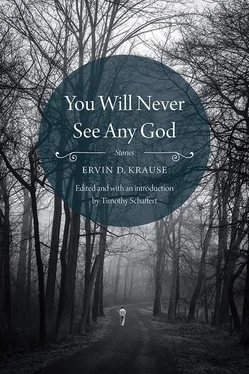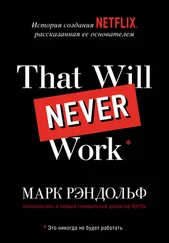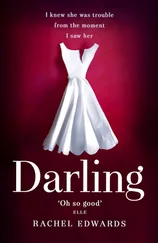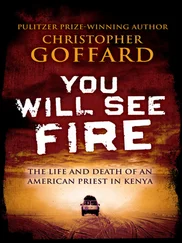Leonard walked along the edge of the creek, the creek itself about forty feet wide in that area, but the water at its bottom only six inches deep and two feet wide, a nice creek with minnows and frogs in abundance. The grass was tall already, pale green and heavy with occasional giant burdocks lifted like watchers. Some of the cattle went ahead of him, splashed through the mud and up the slippery far bank where he would follow. Most of the bank was too steep to be crossed at all, the straight slice of black dirt, caved off in chunks at intervals, and down there the ribbon of water in the sand, the curling motion. He looked for raccoons, knew he would see none now, and remembered, not so certain, how he had seen one in broad daylight up on the farm one spring, and watched, looked at the placid water reflecting reeds, the smear of sky, himself.
Four weeks before he had come (he and his wife) to visit his mother; in the best of health, he thought, except for that persistent new back ache, something clamped on him that wouldn’t let go, and he’d lost weight, everyone noticed that right away, and he’d said it was his diet, one that had never worked before, some slight fevers, dizziness. And now confirmed in the ancient certainty of his own mortality, yes truly that over the easy optimism of the others — oh if you find it soon enough they can get it, can work miracles, great doctors nowadays, and so on — but he knew the statistics on this one, most assuredly, two years or three. In three weeks, in a moment really after that first biopsy, from healthy man to dying man. He had not thought of death, before, coming to him, no healthy person of thirty-three would except perhaps melodramatically when having flu or a cold or driving a car fast. He had thought much on it these last three weeks.
He went through the grove of willows, young trees near the creek bed. He was tired now, but he told himself he would not be, not yet. He was though, as he had told himself the cancer could not spread, but it had. He could feel the cut on his neck burning, and the cold lump in him on his side. The young green grass there on the other side of the creek was very heavy, and he looked down at his shoes, hearing as if for eternity the shuff with each step of the grass — shuff, shuff, shuff, not watchful now, knowing he was drifting, bitter and drifting.
The jackrabbit took him by surprise, gave him that sudden striking jolt in his heart region, the flash and movement. The big rabbit had fled the brush, bounded easily up past the spring there on the pasture hillside, a big old jackrabbit, gray with age and remnant of winter coat. Leonard waited, trailing it with the points of the rifle sights. When the animal stopped, as he thought it might, dropped to a pause, let its tall ears fall over its back, Leonard shot it, a good long shot. The rabbit gave a spasm and frantically kicked in a circle when it hit the ground again. Leonard was in no rush getting there. The rabbit was dead, of course, head covered with dust, the dead film on the eyes already. Knobbed feet, old powerful legs, blistered haunches. Tiny bullet, smallest penetration not even to be found but by someone who knew, a fragment of weight against the big heavy rabbit, really a miracle of sorts.
“You were an old one,” Leonard said. “You should have been prepared, shouldn’t you?” touching it with the rifle tip. “How many near misses from coyote or fox or rifle have you had?” He reloaded the clip and grinned. I cannot miss today, he thought. Everything comes down today.
He went down the hill, breathing hard, his head aching a little now, his neck itching. The doctors had encouraged exercise but not too much, to keep his strength, the way the doctors always could blandly respond in clichés, yes one needs milk and exercise and sunshine. For what should he keep his strength, and he knew, for those days of debility that awaited him, this debilitating disease that would grind him down to an emaciated parody of himself until he contracted something like pneumonia that would kill him. Build strength for that.
The cattle at the pinch of the pasture along the creek did not go on ahead of him, as they would before, but turned and came back, right around him.
“Something scares you more than I do,” he murmured.
There was brush and trees along the creek there. A blackbird, the redwing fighter came to heckle him, right over his head, squawking fiercely, and he thought of shooting, decided against it for no good reason. The bird drifted back, apparently keeping near its ground nest, and another little bird came to whistle and shriek at him, a tiny bird, a wren he believed, tiny and brown and very beautiful; he had seen the kind up by the farm. The bird fluttered away, across the creek and to a cottonwood tree quite a distance from him, and he, feeling daring at the chance because of his shooting well that day, balanced the rifle on his left hand, fastened it tightly with his right, and feeling absolutely nothing at all at that distance, shot. There was an astonishing puff of feathers and it came down.
At that moment too he sensed rather than saw a motion, and there through the brush, on the other side of the creek, not fifty feet away, was a car parked, and he saw in the clearing a little distance from the car the figure come up, and he knew suddenly why the cattle would not come any further, this alien thing blocking their way.
There was a motion of the figure as if reaching for something, groping wildly for something, the person had been asleep, Leonard could tell that, and startled with suddenness, and now blinking, staring around, and coming in his alarmed awakening at last to a position on his hands and knees on the blanket behind the car, he at last seeing Leonard and from the drifting feathers, what Leonard shot at — and hit.
He stared like one engulfed, sprung there in his strange posture, caught absolutely, the astonished face, the disheveled hair, the impotent look in the eyes, and the outrage on the face at being caught thus, impotent. For he, Leonard, had the gun.
Leonard knew in that instant that this was the man who was wanted, this was the killer, putting it all together, the necessity of having to take down the fence to park here, the isolated location, the mid-afternoon sleep, and the fright of the young man. He wondered if there was another or two or three. He could see nothing, no one in the car or along the creek.
“Shooting birds, hunh?” the young man over there said, his voice choking. “That was quite a shot.” He knelt, leaning forward on his hands, crouched like a dog, really, looking at Leonard, and Leonard realized then that the other was waiting too, trying to determine Leonard’s exact purpose there, whether he was caught. “You handle a gun pretty good.”
“Not as good as some others,” Leonard said. “Are you alone here?”
“Oh sure, just me.” He tried a grin. “Came down for a break; such a nice peaceful spot.”
He was twenty or twenty-one, Leonard guessed, although he found it difficult to give precise ages, always had, a young man with a decent face, slender, a hundred and fifty pounds or so, five feet eight he guessed, medium brown hair, dark blue eyes, a sort of sandy and freckled look, and he, Leonard, trying to see the mark of a killer on that face, could see nothing, realizing once again that you could not tell anything from the face of a person, nothing at all, from the eyes perhaps, but from the face, nothing, no more than you could tell the character of a cow by the hair on its ears.
“This is your land, I guess?” he asked.
“My brother’s,” Leonard said.
“I don’t suppose he’d like me taking down the gate and driving here in the pasture?”
“No, I don’t suppose he would,” Leonard said.
“Well you know I saw the lane coming down here and the trees and I just figured there was a crick along here. I remembered how nice it was to stop and rest beside a stream like this when I was a kid and my old man and I went up to Minnesota, and I just couldn’t resist it. No damage done.”
Читать дальше











